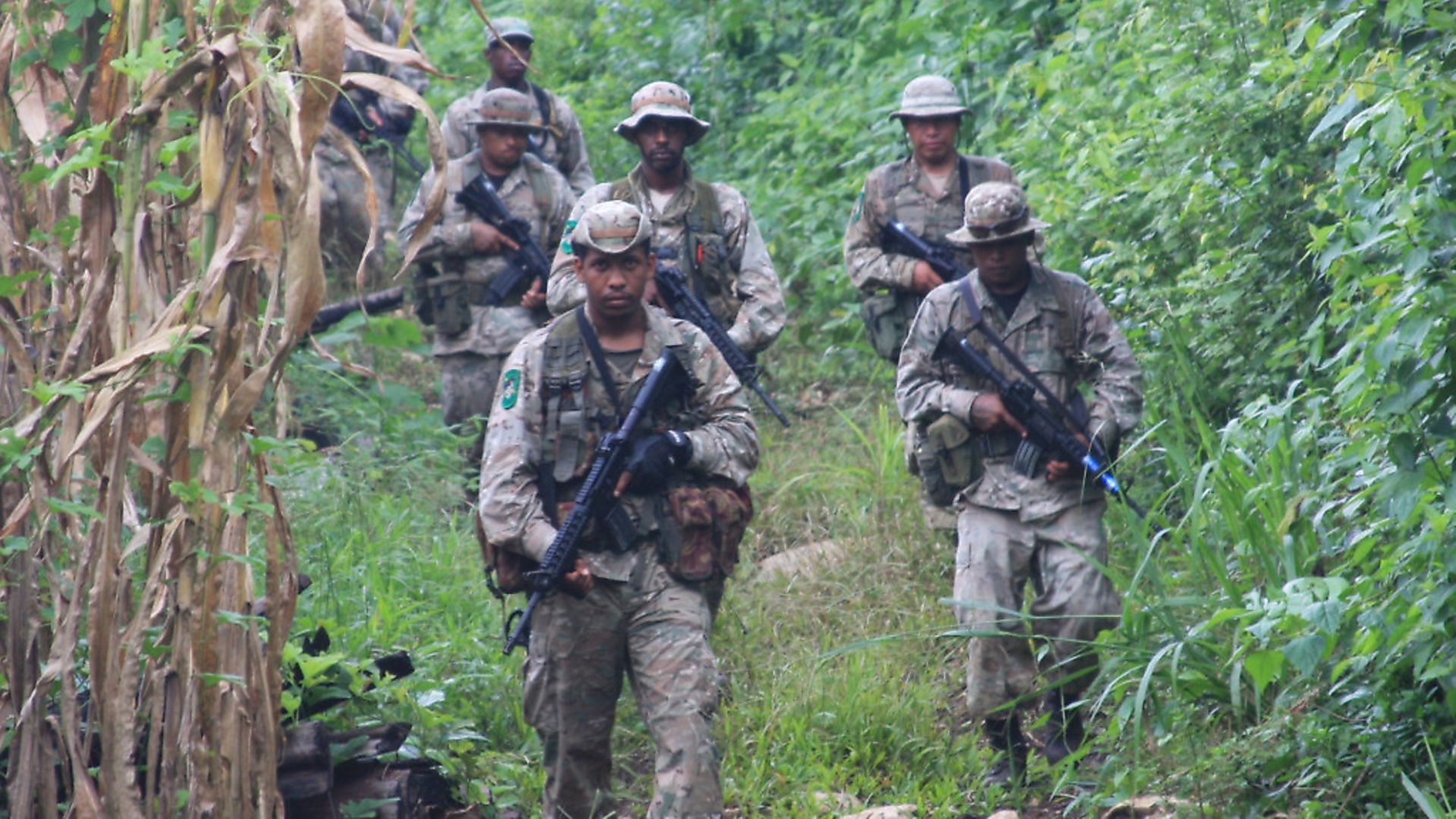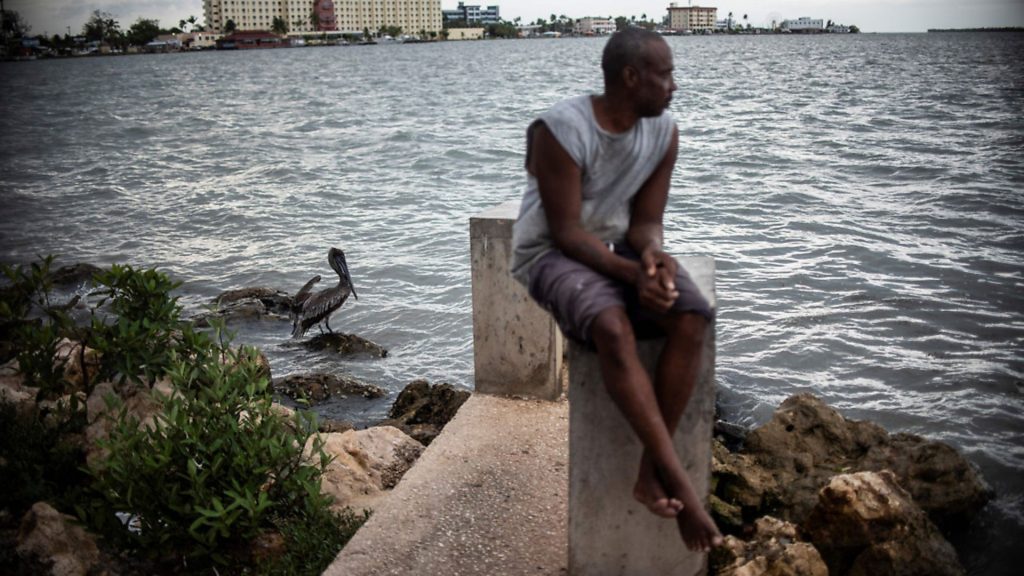
The tiny country was left some considerable baggage by former colonial master Britain, in the shape of a territorial dispute which threatens to halve it in size. Next week its voters must make a stark choice about their nation’s future. WILL WORLEY reports.

Just 40 years ago it was still a British colony, yet Belize is now a largely unknown – and little understood – entity in the UK. The tiny, picturesque country, wedged between south east Mexico and north east Guatemala, prides itself on its biodiversity and is renowned mostly for tourism and as the home of the world’s longest barrier reef.
But Belize – home to fewer than 500,000 people – is a country feeling vulnerable and divided. It is embroiled in a lingering border dispute with its much larger neighbour, Guatemala, which has long staked a claim to half of its land and significant chunks of maritime territory.
A polarising referendum is due to be held on April 10 for Belizeans to decide if their tiny country should fight it out with Guatemala in the International Court of Justice (ICJ) at the Hague, a process which would impose a legally-binding resolution on the territorial sovereignty of the two countries.
The vote is being touted as the biggest political moment for the country since it became independent from the UK in 1981. The UK’s Foreign and Commonwealth Office supports going to the ICJ to end the dispute, but the decision is a far from straightforward one, locally. Belize has no land claims to win in the case, while Guatemala could take half the country if the ICJ ruled in its favour.
‘There has been a divided relationship between our two countries for many years. Various governments have tried to overcome it, but there’s a lot of historical baggage we all carry,’ says Alexis Rosado, former Belizean ambassador to Guatemala who is now running the government’s referendum agency. He adds: ‘The dispute kept getting in the way, and still does. The colonial experience did not help.’
Britain and Guatemala signed a treaty in 1859 which defined the borders of Belize, called British Honduras under colonial rule.
The treaty specified that the British would help build a road from Guatemala City to the Atlantic coast. But the road was never built and Guatemala claimed the 1859 treaty was void, entitling it to Belizean territory.
Military build-ups occasionally reflected escalating bilateral tensions: In 1977, the UK sent tanks and Harrier fighter jets to ward off massing Guatemalan troops. Britain maintains a base in Belize and soldiers still regularly visit for jungle training, before downing lager in sandy tourist towns.
Tensions have cooled since the days of Guatemala’s military dictatorships. Fernando Carrera, a former Guatemalan foreign minister, stressed that there is ‘no potential for war’.
But violence and lawlessness remain in some border areas, with Guatemalan gangs frequently plundering Belize with illegal logging, farming and gold-mining. Such activities are leading to severe environmental damage, according to Rafael Manzanero of Friends for Conservation and Development, an NGO monitoring the Chiquibul National Park, which covers some of the border with Guatemala.
There are sometimes shoot-outs in the border area and in 2016 a 13-year-old Guatemalan boy was shot and killed by the Belize Defence Forces, leading to troop mobilisations.
Despite such long-standing tensions, as well as language differences – English is the official language of Belize, while it is Spanish in Guatemala – among the local populations, cross-border relations tend to be cordial and many Belizeans have personal links with their larger neighbour.
But the fear of Guatemalan might lingers at the back of many Belizean minds – the country’s notorious Kaibiles special forces are stationed close to the border – despite political reassurances that there will not be an armed intervention to resolve the dispute.
After the turn of the millennium, there were various rounds of negotiations, leading to a monitored two-kilometre ‘Adjacency Zone’ between the two countries in 2003. Guatemala later pushed to go to the ICJ, which it secured through a Special Agreement in 2008, conditional to referendums in both countries.
Guatemala’s citizens voted overwhelmingly, by 96%, to go the Hague last April – although the turnout was just 27% cent.
In Belize, which has – literally – much to lose from the court case, and nothing to gain, the issue is both bigger and more divisive. Supporters of going to the ICJ view it as the chance to settle their country’s issues with Guatemala once and for all.
‘It is a natural conclusion to the independence struggle,’ says Valerie Woods, a senator for the opposition People’s United Party (PUP) who broke with her party’s official position to campaign for the ‘Yes’ vote.
Yes supporters cite the various international legal opinions Belize has received which they say supports their case at the Hague. ‘It’s difficult not to reach a Yes conclusion when presented with facts,’ Woods says.
Rosado, the former ambassador, adds: ‘All studies have reached the same conclusion. We are comfortable with our position.’ As head of the referendum unit, he claims to maintain neutrality but his comments gravitate in favour of going to the Hague.
He says a resolution with the ICJ has historical precedence in the region and would ‘definitely’ solve the issue once and for all, allowing the two countries to improve relations.
‘It’s part of a regional initiative to promote more cooperation and promote peace and neighbourliness, and to remove barriers to do such things,’ Rosado says.
But opponents of going to the ICJ say Belize should not have to bend to Guatemala’s request for a legal resolution and surrender sovereignty to a distant international court, with the risk it could lose massive amounts of territory. The slogan ‘not a blade of grass, not a grain of sand – Belize is our land’ is common among No supporters.
‘This is our country. If we go and make a mistake, and a bad decision is handed down against Belize, we have to live with that forever,’ says Lindsay Belisle, a former boundary commissioner and member of the Belize Peace Movement, a leading group in the ‘No’ campaign.
He continues: ‘We don’t want to take the risk. There is no such thing as a watertight case, there’s always litigation risk.’
There is a feeling, among many Belizeans, that the Yes campaign – led largely by the country’s elite and its political grandees – is benefiting from a strong bias among the establishment, which argues the case is ‘watertight’. It has received extensive media time and has paid for vast amounts of advertising online, at events and in the streets.
Belisle would prefer an advisory opinion from the ICJ ‘to help chart the way forward’ and go ‘on solid ground, incrementally’.
His concern becomes more understandable when Guatemala’s perspective is heard. Carrera, the former minister, is open about his country’s ambitions, and says: ‘We want the full package.’
This includes ‘all land, territorial and islands, south of the river in Orange Walk [a district in northern of Belize]’. He adds: ‘It’s 50% of the territory comprising Belize today.’ Carrera also says Guatemala’s limited access to the Caribbean Sea – via the Gulf of Honduras, centred on the port of Puerto Barrios – is ‘irregular’ in comparison to neighbouring countries, and the government would like more maritime and island territory. But he adds: ‘We’re not trying to completely dismember Belize.’
For anyone who may suddenly find themselves living in newly-Guatemalan territory, Carrera says the government ‘will settle peacefully any potential conflicts with current Belizean citizens’.
He is also clear that Guatemala would benefit from the tourism value of southern Belize, which is rich in natural resources, like the Barrier Reef, which Carrera says should be protected. The Belize government currently bans all offshore oil exploration on its coast.
Given the stakes involved, many Belizeans have been left feeling confused and scared for the country’s future. The debate has split politically with the governing United Democratic Party (UDP) supporting ICJ litigation, and the PUP opposing it – frustrating many who believed it should be a bipartisan issue.
Either side of the campaign has accused the other of numerous shortcomings, and allegations fly around of financial impropriety, bias, fearmongering, exclusion from debates and misinformation.
Anxiety among the public is compounded by widespread mistrust in Belize’s political system, which has greatly contributed to uncertainty over the referendum, along with the complex legalities at the core of the case.
‘This is a decision regular people don’t have enough knowledge to vote on, you need a law degree to understand it,’ says Felipe Sansores, a hotel manager from San Pedro. Highlighting the myriad corruption allegations that dog Belizean politics, he added: ‘It makes me suspicious so many people want an international court to decide Belize’s position… We are being sold a 100% case.’
Aneurin Foster, a construction worker from the western Cayo district says: ‘Them pushing so hard [for the ICJ] is very sketchy, I can’t tell if they are genuine in what they say or they are just setting themselves up for the ultimate pay day.’
Osmany Salas, an independent senator representing Belizean NGOs, admits: ‘There is wide distrust of government, because the government has lost a lot of court cases all the way up to the Caribbean Court of Justice. They have not had a high success rate of winning those cases.’
It just adds to the uncertainty for Belizeans, who have a lot more to lose than their neighbour. Guatemala is grappling with a catalogue of serious domestic issues, including elections in June which are expected to be highly fraught.
The border with Belize is a non-issue for most people and their own referendum is forgotten about, says Carrera.
Time will tell if some Belizean fears are justified.










